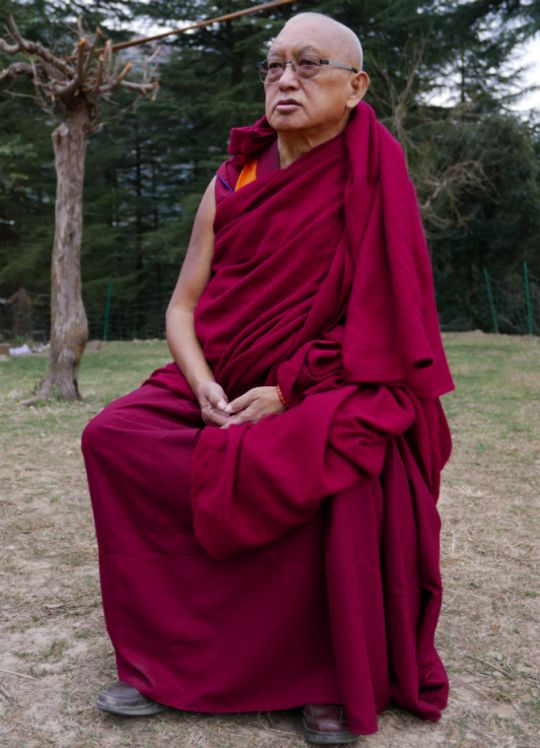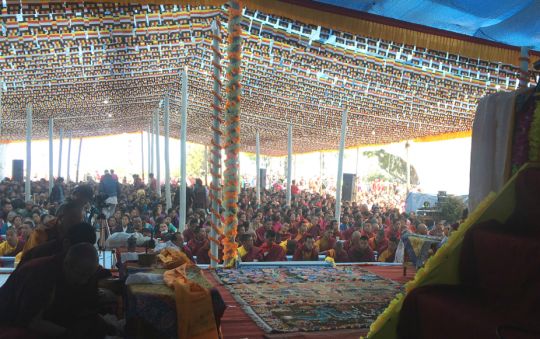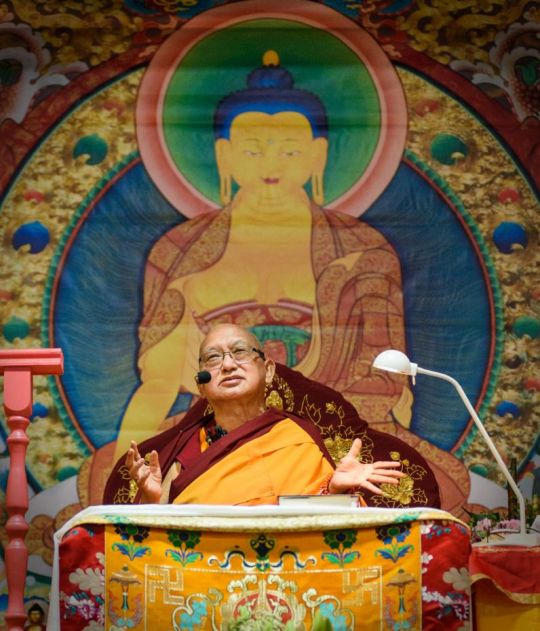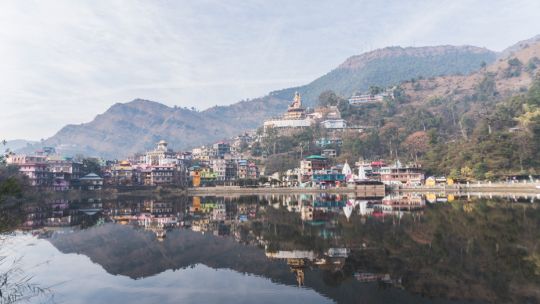- Home
- FPMT Homepage
Foundation for the Preservation of the Mahayana Tradition
The FPMT is an organization devoted to preserving and spreading Mahayana Buddhism worldwide by creating opportunities to listen, reflect, meditate, practice and actualize the unmistaken teachings of the Buddha and based on that experience spreading the Dharma to sentient beings. We provide integrated education through which people’s minds and hearts can be transformed into their highest potential for the benefit of others, inspired by an attitude of universal responsibility and service. We are committed to creating harmonious environments and helping all beings develop their full potential of infinite wisdom and compassion. Our organization is based on the Buddhist tradition of Lama Tsongkhapa of Tibet as taught to us by our founders Lama Thubten Yeshe and Lama Thubten Zopa Rinpoche.
- Willkommen
Die Stiftung zur Erhaltung der Mahayana Tradition (FPMT) ist eine Organisation, die sich weltweit für die Erhaltung und Verbreitung des Mahayana-Buddhismus einsetzt, indem sie Möglichkeiten schafft, den makellosen Lehren des Buddha zuzuhören, über sie zur reflektieren und zu meditieren und auf der Grundlage dieser Erfahrung das Dharma unter den Lebewesen zu verbreiten.
Wir bieten integrierte Schulungswege an, durch denen der Geist und das Herz der Menschen in ihr höchstes Potential verwandelt werden zum Wohl der anderen – inspiriert durch eine Haltung der universellen Verantwortung und dem Wunsch zu dienen. Wir haben uns verpflichtet, harmonische Umgebungen zu schaffen und allen Wesen zu helfen, ihr volles Potenzial unendlicher Weisheit und grenzenlosen Mitgefühls zu verwirklichen.
Unsere Organisation basiert auf der buddhistischen Tradition von Lama Tsongkhapa von Tibet, so wie sie uns von unseren Gründern Lama Thubten Yeshe und Lama Thubten Zopa Rinpoche gelehrt wird.
- Bienvenidos
La Fundación para la preservación de la tradición Mahayana (FPMT) es una organización que se dedica a preservar y difundir el budismo Mahayana en todo el mundo, creando oportunidades para escuchar, reflexionar, meditar, practicar y actualizar las enseñanzas inconfundibles de Buda y en base a esa experiencia difundir el Dharma a los seres.
Proporcionamos una educación integrada a través de la cual las mentes y los corazones de las personas se pueden transformar en su mayor potencial para el beneficio de los demás, inspirados por una actitud de responsabilidad y servicio universales. Estamos comprometidos a crear ambientes armoniosos y ayudar a todos los seres a desarrollar todo su potencial de infinita sabiduría y compasión.
Nuestra organización se basa en la tradición budista de Lama Tsongkhapa del Tíbet como nos lo enseñaron nuestros fundadores Lama Thubten Yeshe y Lama Zopa Rinpoche.
A continuación puede ver una lista de los centros y sus páginas web en su lengua preferida.
- Bienvenue
L’organisation de la FPMT a pour vocation la préservation et la diffusion du bouddhisme du mahayana dans le monde entier. Elle offre l’opportunité d’écouter, de réfléchir, de méditer, de pratiquer et de réaliser les enseignements excellents du Bouddha, pour ensuite transmettre le Dharma à tous les êtres. Nous proposons une formation intégrée grâce à laquelle le cœur et l’esprit de chacun peuvent accomplir leur potentiel le plus élevé pour le bien d’autrui, inspirés par le sens du service et une responsabilité universelle. Nous nous engageons à créer un environnement harmonieux et à aider tous les êtres à épanouir leur potentiel illimité de compassion et de sagesse. Notre organisation s’appuie sur la tradition guéloukpa de Lama Tsongkhapa du Tibet, telle qu’elle a été enseignée par nos fondateurs Lama Thoubtèn Yéshé et Lama Zopa Rinpoché.
Visitez le site de notre Editions Mahayana pour les traductions, conseils et nouvelles du Bureau international en français.
Voici une liste de centres et de leurs sites dans votre langue préférée
- Benvenuto
L’FPMT è un organizzazione il cui scopo è preservare e diffondere il Buddhismo Mahayana nel mondo, creando occasioni di ascolto, riflessione, meditazione e pratica dei perfetti insegnamenti del Buddha, al fine di attualizzare e diffondere il Dharma fra tutti gli esseri senzienti.
Offriamo un’educazione integrata, che può trasformare la mente e i cuori delle persone nel loro massimo potenziale, per il beneficio di tutti gli esseri, ispirati da un’attitudine di responsabilità universale e di servizio.
Il nostro obiettivo è quello di creare contesti armoniosi e aiutare tutti gli esseri a sviluppare in modo completo le proprie potenzialità di infinita saggezza e compassione.
La nostra organizzazione si basa sulla tradizione buddhista di Lama Tsongkhapa del Tibet, così come ci è stata insegnata dai nostri fondatori Lama Thubten Yeshe e Lama Zopa Rinpoche.
Di seguito potete trovare un elenco dei centri e dei loro siti nella lingua da voi prescelta.
- 欢迎 / 歡迎
简体中文
“护持大乘法脉基金会”( 英文简称:FPMT。全名:Foundation for the Preservation of the Mahayana Tradition) 是一个致力于护持和弘扬大乘佛法的国际佛教组织。我们提供听闻,思维,禅修,修行和实证佛陀无误教法的机会,以便让一切众生都能够享受佛法的指引和滋润。
我们全力创造和谐融洽的环境, 为人们提供解行并重的完整佛法教育,以便启发内在的环宇悲心及责任心,并开发内心所蕴藏的巨大潜能 — 无限的智慧与悲心 — 以便利益和服务一切有情。
FPMT的创办人是图腾耶喜喇嘛和喇嘛梭巴仁波切。我们所修习的是由两位上师所教导的,西藏喀巴大师的佛法传承。
繁體中文
護持大乘法脈基金會”( 英文簡稱:FPMT。全名:Found
ation for the Preservation of the Mahayana Tradition ) 是一個致力於護持和弘揚大乘佛法的國際佛教組織。我們提供聽聞, 思維,禪修,修行和實證佛陀無誤教法的機會,以便讓一切眾生都能 夠享受佛法的指引和滋潤。 我們全力創造和諧融洽的環境,
為人們提供解行並重的完整佛法教育,以便啟發內在的環宇悲心及責 任心,並開發內心所蘊藏的巨大潛能 — 無限的智慧與悲心 – – 以便利益和服務一切有情。 FPMT的創辦人是圖騰耶喜喇嘛和喇嘛梭巴仁波切。
我們所修習的是由兩位上師所教導的,西藏喀巴大師的佛法傳承。 察看道场信息:
- FPMT Homepage
- News/Media
-
- Study & Practice
-
-
- About FPMT Education Services
- Latest News
- Programs
- New to Buddhism?
- Buddhist Mind Science: Activating Your Potential
- Heart Advice for Death and Dying
- Discovering Buddhism
- Living in the Path
- Exploring Buddhism
- FPMT Basic Program
- FPMT Masters Program
- FPMT In-Depth Meditation Training
- Maitripa College
- Lotsawa Rinchen Zangpo Translator Program
- Universal Education for Compassion & Wisdom
- Online Learning Center
-
- Prayers & Practice Materials
- Overview of Prayers & Practices
- Full Catalogue of Prayers & Practice Materials
- Explore Popular Topics
- Benefiting Animals
- Chenrezig Resources
- Death & Dying Resources
- Lama Chopa (Guru Puja)
- Lama Zopa Rinpoche: Compendium of Precious Instructions
- Lama Zopa Rinpoche: Life Practice Advice
- Lama Zopa Rinpoche Practice Series
- Lamrim Resources
- Mantras
- Prayer Book Updates
- Purification Practices
- Sutras
- Thought Transformation (Lojong)
- Audio Materials
- Dharma Dates - Tibetan Calendar
- Translation Services
- Publishing Services
- Ways to Offer Support
- Prayers & Practice Materials
-
- Teachings and Advice
- Find Teachings and Advice
- Lama Zopa Rinpoche Advice Page
- Lama Zopa Rinpoche: Compendium of Precious Instructions
- Lama Zopa Rinpoche Video Teachings
- ༧སྐྱབས་རྗེ་བཟོད་པ་རིན་པོ་ཆེ་མཆོག་ནས་སྩལ་བའི་བཀའ་སློབ་བརྙན་འཕྲིན།
- Podcasts
- Lama Yeshe Wisdom Archive
- Buddhism FAQ
- Dharma for Young People
- Resources on Holy Objects
- Teachings and Advice
-
-
*If a menu item has a submenu clicking once will expand the menu clicking twice will open the page.
-
-
- Centers
-
- Teachers
-
- Projects
-
-
-
-
*If a menu item has a submenu clicking once will expand the menu clicking twice will open the page.
-
-
- FPMT
-
-
-
-
-
Bad Education is like a prison. We must learn to open the prison, and psychologically liberate human beings.
Lama Yeshe
-
-
-
- Shop
-
-
-
The Foundation Store is FPMT’s online shop and features a vast selection of Buddhist study and practice materials written or recommended by our lineage gurus. These items include homestudy programs, prayers and practices in PDF or eBook format, materials for children, and other resources to support practitioners.
Items displayed in the shop are made available for Dharma practice and educational purposes, and never for the purpose of profiting from their sale. Please read FPMT Foundation Store Policy Regarding Dharma Items for more information.
-
-
Lama Zopa Rinpoche News and Advice
11
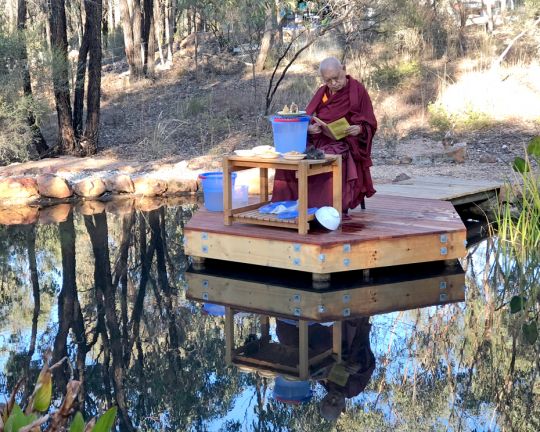
Lama Zopa Rinpoche offering to pretas and doing Dzambala practice at the lake near Thubten Shedrup Ling Monastery, Bendigo, Australia, April 2018. Photo by Ven. Roger Kunsang.
Lama Zopa Rinpoche explains how peace and happiness come from meditation in this teaching recently published in the Lama Yeshe Wisdom Archive April 2018 E-Letter.
Peace and happiness in life come when we free ourselves from the dissatisfied mind of desire. Satisfaction comes when we give ourselves freedom, or independence, from the unhappy mind of desire.
How do we free ourselves from the dissatisfied mind of desire and the other unhealthy minds that make our life unhappy? How do we fill up the emptiness in our heart? The answer is meditation. It is only through meditation practice that we can free ourselves from desire and other disturbing thoughts. And we then need to develop the good heart, not only not giving harm to other sentient beings but also benefiting them. Again that comes from meditation. That’s why we need to practice meditation.
No matter how many friends and other external things we have, that alone is not sufficient. We need friends, but no matter how many hundreds or even thousands of friends we have, that alone doesn’t bring us peace, happiness, and satisfaction. Even after we have found friends there is still something missing in our heart. We are not fully satisfied. That is because we have the dissatisfied mind of desire and lack loving kindness and compassion. Simply having friends is not sufficient to bring peace and happiness. We need to practice the good heart. What is missing is the good heart.
Also, no matter how much wealth we have, there’s still no peace, happiness, and satisfaction in our life. There is still something missing. Things are not perfect. Something else is needed. If we were able to obtain all the wealth in the world, or even if we were able to become just a millionaire, when we checked in our heart whether or not things were now perfect, we would still not be fully satisfied. There would still be something missing. There would be an empty place in our heart. This tells us that wealth alone is not sufficient to bring peace, happiness, and satisfaction.
What we need is something that frees us from the dissatisfied mind of desire and self-cherishing thought and brings satisfaction and the good heart. Again, the answer is meditation practice. This is what gives us freedom from the dissatisfied mind of desire, self-cherishing thought, and the other unhappy minds.
No matter how famous we are or how much power we have it is the same. Even if everyone in the whole world knew who we were, if we checked in our heart there would be something missing. Even though everything looked good on the outside, there would be something missing on the inside.
Again, what is missing is meditation practice, which transforms our mind from self-cherishing into cherishing other sentient beings, into loving kindness, compassion, and the good heart. Meditation also transforms the unhappy, dissatisfied mind of desire into the satisfied mind. Simply being famous or powerful cannot bring you this peace and happiness. Even if you are famous or powerful, it’s not enough. A free mind, a happy mind, a satisfied mind—all these come through meditation, not through external things. You have to obtain happiness from your own mind, through meditation. It is your own mind that stops your suffering and confusion; it is your own mind that brings you happiness.
Even if you had all the power in the world, if you didn’t have a good heart, that power could become dangerous. Without concern for others, the more power you got, the more dangerous you would become to other sentient beings in your country and in the world. It also means you would become more dangerous to yourself, since more harm to other sentient beings ultimately means more harm to yourself.
There is nothing wrong with having power—the problem is having power without having a good heart. Behind the power should be a good heart, which makes the power beneficial for the world and for all sentient beings. If there is no motivation of good heart for using the power, the power becomes like poison and is dangerous even to the person who has it. Having power is not sufficient. For the power to be safe, it has to come from the good heart.
You need meditation practice, even for your own peace, happiness, and satisfaction. It has to do with the mind, with your own mind. It’s not that somebody can transplant happiness into you, like transplanting a heart. The mind of a buddha or some other holy being can’t be transplanted into you. Happiness and satisfaction have to come from your own mind. You have to transform the minds that bring problems to you and to others into healthy, peaceful, positive minds—such as loving kindness, compassion, and altruism—which bring peace and happiness to you and to others.
“Happiness Comes from Your Own Mind” comes from teachings given by Lama Zopa Rinpoche in Auckland, New Zealand in 1990. This teaching was edited by Ven. Ailsa Cameron and published in Lama Yeshe Wisdom Archive April 2018 E-Letter:
https://lamayeshe.com/article/e-letter-no-178-april-2018
You can watch Lama Zopa Rinpoche teach during the Bodhicaryavatara and Rinjung Gyatsa Retreat at The Great Stupa of Universal Compassion in Bendigo, Australia, March 30-May 12, 2018.
- Find links to watch teachings LIVE:
https://fpmt.org/media/streaming/lama-zopa-rinpoche-live/ - Watch, read, and listen to all of Rinpoche’s teachings from Bendigo at anytime:
https://fpmt.org/media/streaming/teachings-of-lama- zopa-rinpoche/
More information, photos and updates about FPMT spiritual director Lama Zopa Rinpoche can be found on Rinpoche’s webpage on FPMT.org. If you’d like to receive news of Lama Zopa Rinpoche and FPMT via email, sign up to FPMT News.
4
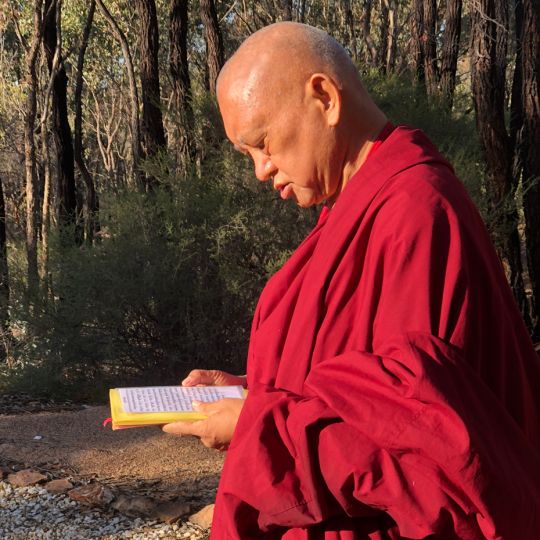
Lama Zopa Rinpoche offering to pretas and doing Dzambala practice at the lake near Thubten Shedrup Ling Monastery, where Rinpoche is staying during the retreat, Bendigo, Australia, April 2018. Photo by Ven. Roger Kunsang.
Lama Zopa Rinpoche continues to give moving and in-depth teachings at the retreat being held at The Great Stupa of Universal Compassion in Bendigo, Australia. It is now the fifth week of the six-week long Bodhicaryavatara and Rinjung Gyatsa Retreat. Rinpoche has started the Heruka initiation.
Often teaching two sessions a day, Rinpoche’s has focused extensively on correctly following the guru in thought and action. During the first three weeks, Rinpoche devoted time during many sessions to explaining the meaning of “Lama” from “LAMA TÖN PA CHOM DÄN … ,” the “Praise to Shakyamuni Buddha,” which retreat participants recite everyday. During a teaching in the fourth week, Rinpoche explained the rest of the verse.
Rinpoche has also been teaching on emptiness and how to meditate on it.
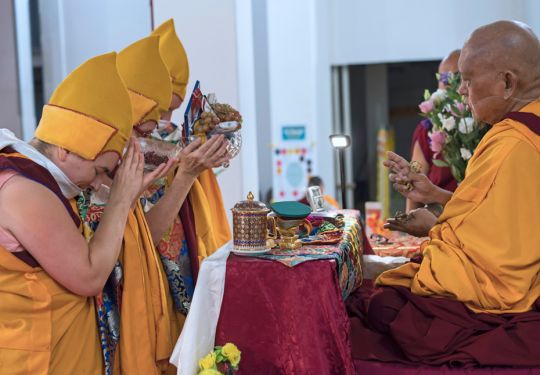
Tsog offering during the retreat, Great Stupa of Universal Compassion, Bendigo, Australia, April 2018. Photo by Ven. Lobsang Sherab.
Retreatants start at 5:30 or 6 a.m., taking precepts every other day, then doing morning prayers, prostrations by reciting the names of the 35 Buddhas, and then Lama Chöpa practice led by Ven. Thubten Dechen. In addition to the teaching sessions, there are daily discussion groups.
When Rinpoche isn’t teaching, different Geshes and senior teachers lead, such as Geshe Thubten Rapten, resident geshe at the nearby Thubten Shedrup Ling Monastery, Geshe Tenzin Zopa, Ven. Thubten Gyatso, Ven. Tony Beaumont, and many others. To close the day, retreatants do protector prayers, Vajrasattva practice, and dedication prayers, wrapping up at 10:30 or 11 p.m.
There are seventy-five Sangha doing the retreat, as well as four Geshes. One participant said that this retreat had been the highlight of her life.
Retreat participants have “great energy and are seriously doing the retreat,” according to Ven. Holly Ansett, who has been making sure the teachings are recorded on video and streamed live online. “Rinpoche is teaching an incredible amount,” Ven. Holly said. “And the teachings themselves have been beautiful and exquisite. They really move the mind.”
Watch Rinpoche teach on “LAMA TÖN PA CHOM DÄN DE …”:
https://youtu.be/HkM5tTZNgl8
You can watch Lama Zopa Rinpoche teach during the Bodhicaryavatara and Rinjung Gyatsa Retreat at The Great Stupa of Universal Compassion in Bendigo, Australia, March 30-May 12, 2018.
- Find links to watch teachings LIVE:
https://fpmt.org/media/streaming/lama-zopa-rinpoche-live/ - Watch, read, and listen to all of Rinpoche’s teachings from Bendigo at anytime:
https://fpmt.org/media/streaming/teachings-of-lama- zopa-rinpoche/
Lama Zopa Rinpoche is the spiritual director of the Foundation for the Preservation of Mahayana Tradition (FPMT), a Tibetan Buddhist organization dedicated to the transmission of the Mahayana Buddhist tradition and values worldwide through teaching, meditation, and community service.
27
Mindfulness of how things exist as merely labeled by the mind can bring peace and happiness, Lama Zopa Rinpoche explained while teaching at the 100 Million Mani Mantra Retreat in Italy.
“What you see, what you hear, what you think, what you taste, what you touch—all the six objects—are merely labeled by your mind. Every second, every minute, every hour, every day, from birth to death, everything is merely labeled by your mind, including your I,” Rinpoche says in the teaching shared in a nine-minute video clip.
By observing that everything from beginningless rebirths to endless future lives is merely imputed by your mind, your meditation on mindfulness becomes more profound, Rinpoche explains:
“It is so important; we can do meditation on just this for weeks, for months, for years. It is so good. It is so fantastic! It brings only calmness—only peace and happiness.
“In reality, nothing exists from its own side, including the I. There is no I from its own side. There is no action existing from its own side. There is no object existing from its own side. There is nothing—forms, sounds, smells, tastes, tangible objects, all this—that exists from there, except what is merely labeled by your mind. That is the reality!
“So do mindfulness of that for a weekend, then weeks, months, even years. After we receive many teachings on emptiness, this is what you have to practice, meditate on. You have to practice mindfulness of this in daily life, whether you are doing business, whether you are doing cooking, whatever work you are doing, secretary or whatever!
“For example, when somebody complains about you, makes you angry, at that time, meditate. Look at the I and think the I is merely labeled by mind. Look at the reality of the I, what exists, what doesn’t exist. Think the I is merely labeled by mind; meditate on that. The great anger [you feel] at the person who complains about you, abuses you, stops. The minute you think about how the I is merely labeled by the mind, the anger is gone.
“So therefore, you can see in daily life, when you are doing business, when life is so busy, when you are talking to people, whatever you are doing, part of your mind is in meditation on mindfulness. That is incredible. It gives peace and happiness in your heart, in your life.”
The quotes from Rinpoche have been lightly edited and are based on the unedited transcript of the 100 Million Mani Mantra retreat in Italy, which you can find here with video recordings of the complete teachings:
https://fpmt.org/media/streaming/teachings-of-lama-zopa-rinpoche/100-million-mani-mantra-retreat-2017/
Watch Lama Zopa Rinpoche teach during the Bodhicaryavatara and Rinjung Gyatsa Retreat at The Great Stupa of Universal Compassion in Bendigo, Australia, March 30-May 12, 2018.
- Find links to watch teachings LIVE:
https://fpmt.org/media/streaming/lama-zopa-rinpoche-live/ - Watch, read, and listen to all of Rinpoche’s teachings from Bendigo at anytime:
https://fpmt.org/media/streaming/teachings-of-lama- zopa-rinpoche/
Lama Zopa Rinpoche is the spiritual director of the Foundation for the Preservation of Mahayana Tradition (FPMT), a Tibetan Buddhist organization dedicated to the transmission of the Mahayana Buddhist tradition and values worldwide through teaching, meditation, and community service.
- Tagged: essential extract, lama zopa rinpoche, mindfulness, video
19
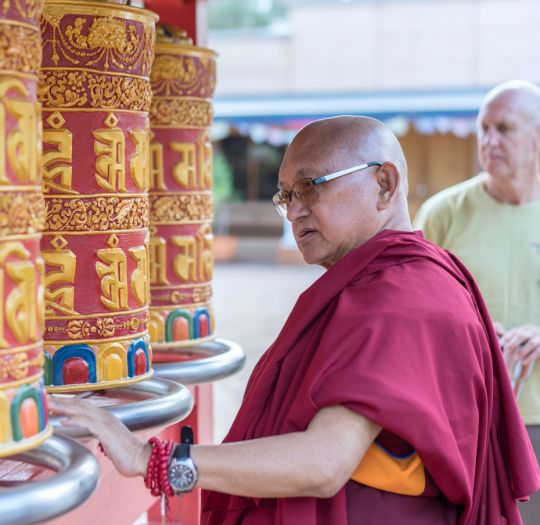
Lama Zopa Rinpoche spinning prayer wheels at Atisha Centre, Bendigo, Australia, April 2018. Photo by Ven. Lobsang Sherab.
“Achieving enlightenment by depending on Buddha, Victorious One, is exactly the same as achieving enlightenment by depending on sentient beings,” Lama Zopa Rinpoche teaches during a session of the 2017 Light of the Path retreat, captured in this six-minute video clip.
“By depending on the Buddha, you achieve enlightenment. So, you think the Buddha is so precious, so important. So why not [think this way about] sentient beings? Because you achieve enlightenment by depending on sentient beings. Buddha came from sentient beings, Dharma came from sentient beings, Sangha came from sentient beings—in whom you always take refuge when you begin a practice,” Rinpoche says.
Rinpoche reminds students that sentient beings are the source of every happiness up to enlightenment and should be regarded as most precious.
“So when you think, ‘there is ant, there is a worm, there is a worm being eaten by bird or chicken or something, or insects attacked by ants or something, mosquito or something,’ then you think, ‘The numberless buddhas came from this insect, numberless buddhas, as well as Dharma, as well as Sangha, the three rare precious ones, rare sublime ones, numberless.’”
“Achieving Dharma from the Buddha is the same as sentient beings, it is exactly the same, exactly the same. So as you respect the Buddha, why not respect the sentient beings?” Rinpoche says.
Watch Rinpoche teach “By Cherishing Sentient Beings You Will Achieve Enlightenment”:
https://youtu.be/g3SE_VpqoXw
Quoted text based on the unedited transcript for the 2017 Light for the Path retreat, which you can find here with video recordings of the complete teachings:
https://fpmt.org/media/streaming/teachings-of-lama-zopa-rinpoche/light-of-the-path-teachings-2017/
Watch Lama Zopa Rinpoche teach during the Bodhicaryavatara and Rinjung Gyatsa Retreat at The Great Stupa of Universal Compassion in Bendigo, Australia, March 30-May 12, 2018.
- Find links to watch teachings LIVE:
https://fpmt.org/media/streaming/lama-zopa-rinpoche-live/ - Watch, read, and listen to all of Rinpoche’s teachings from Bendigo at anytime:
https://fpmt.org/media/streaming/teachings-of-lama- zopa-rinpoche/
Lama Zopa Rinpoche is the spiritual director of the Foundation for the Preservation of Mahayana Tradition (FPMT), a Tibetan Buddhist organization dedicated to the transmission of the Mahayana Buddhist tradition and values worldwide through teaching, meditation, and community service.
- Tagged: essential extract, lama zopa rinpoche, video
16
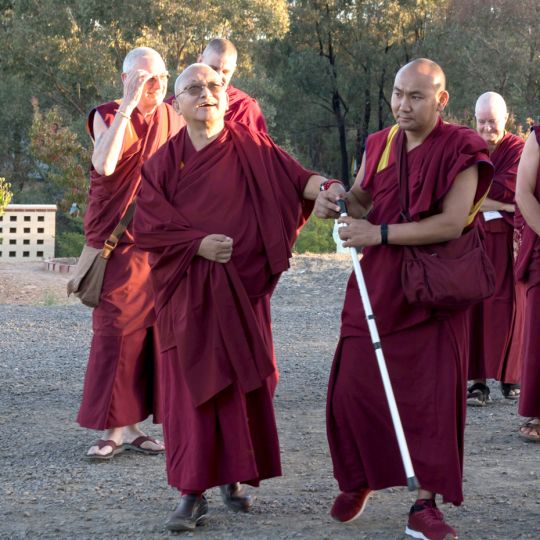
Lama Zopa Rinpoche with Ven. Thubten Tendar looking at The Great Stupa of Universal Compassion, Australia, March 2018. Photo by Ven. Lobsang Sherab.
Lama Zopa Rinpoche begins a third week of teachings at The Great Stupa of Universal Compassion in Bendigo, Australia, for the six-week long Bodhicaryavatara and Rinjung Gyatsa Retreat. During the first two weeks of the retreat, Rinpoche’s teachings, more than two dozen, have been streamed live online. In addition, recordings of the teachings can be watched online.
Rinpoche so far has spent a lot of time giving instructions on how to do prayers and practices, such as Lama Chöpa; on generating correct motivation; on guru devotion; and on other topics.
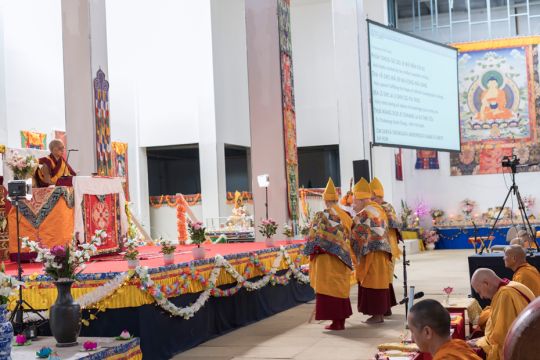
Nuns doing bath offering during Lama Chöpa Jorcho, The Great Stupa of Universal Compassion, Australia, April 2018. Photo by Ven. Lobsang Sherab.
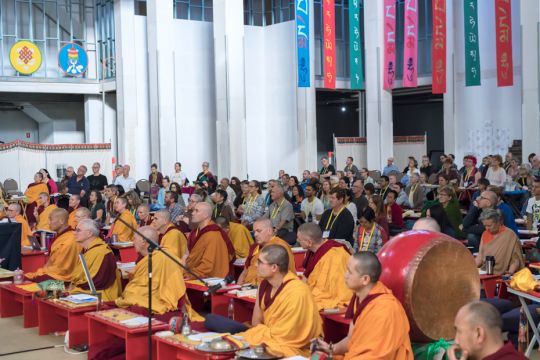
Retreat participants listening to teaching, The Great Stupa of Universal Compassion, Australia, April 2018. Photo by Ven. Lobsang Sherab.
The retreat is being held in the large gompa inside of The Great Stupa of Universal Compassion. Ven. Holly Ansett shared that it is a very good setting for the retreat, that everything has been well arranged, and that retreat organizers have thought of everything.
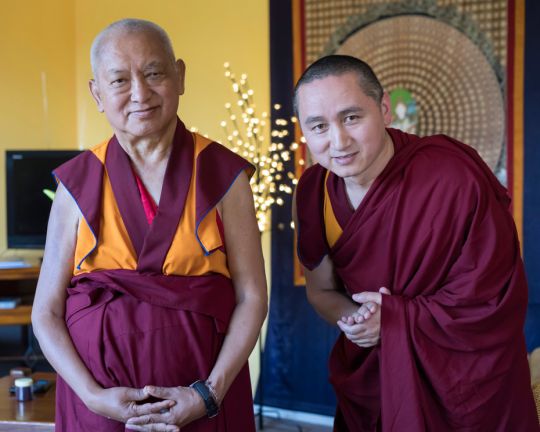
Lama Zopa Rinpoche with Geshe Tenzin Zopa, Bendigo, Australia, April 2018. Photo by Ven. Lobsang Sherab.
The retreat is well attended, with many Sangha and long-time senior students there. Geshe Thubten Rapten, resident geshe at the nearby Thubten Shedrup Ling Monastery, attends many of the sessions with Rinpoche and teaches some of the afternoon sessions. Geshe Tenzin Zopa is attending the entire retreat. Michael Losang Yeshe is serving as the retreat leader. Approximately 180 people attended the first week.
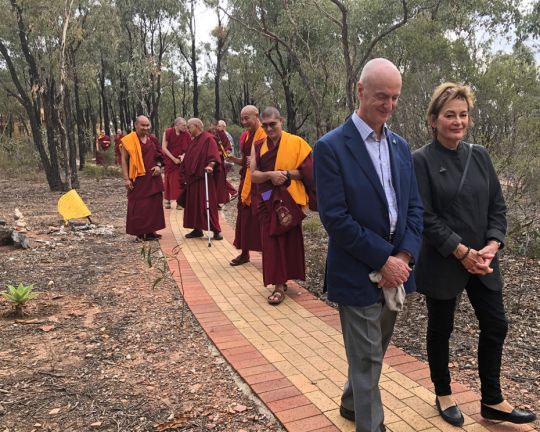
Walking to The Great Stupa of Universal Compassion from Thubten Shedrup Ling, Australia, April 2018. Photo by Ven. Lobsang Sherab.
Rinpoche is staying at Thubten Shedrup Ling, which is adjacent to The Great Stupa, and walks from there to give teachings. On the walks, Rinpoche is very careful not to step on any ants on the path and reminds others to do the same.
On one day, Rinpoche received a tour of The Great Stupa, including visiting the top of the stupa.
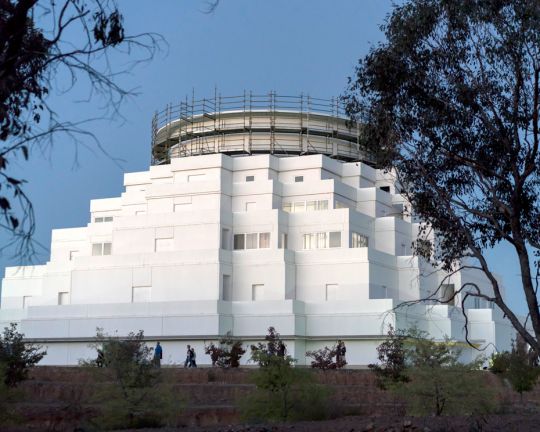
The Great Stupa of Universal Compassion, Australia, April 2018. Photo by Ven. Lobsang Sherab.
Rinpoche also visited Atisha Centre, which is next to The Great Stupa.
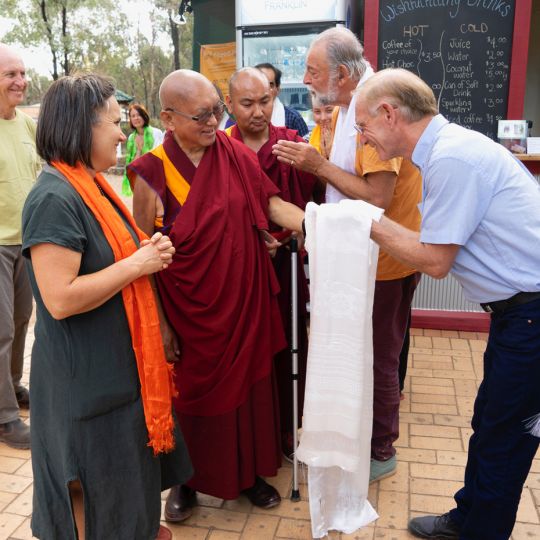
Lama Zopa Rinpoche being greeted by current Atisha Centre director Ruby Karmay and former director Liam Chambers, during Rinpoche’s visit to the center’s courtyard, Australia, April 2018. Photo by Andy Melnic.
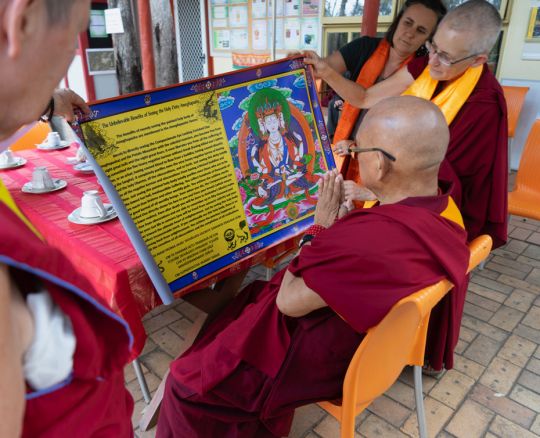
Rinpoche looking at a banner of Amoghapasha during visit to Atisha Centre, Australia, April 2018. Photo by Andy Melnic.
Watch Lama Zopa Rinpoche teach during the Bodhicaryavatara and Rinjung Gyatsa Retreat at The Great Stupa of Universal Compassion in Bendigo, Australia, March 30-May 12, 2018.
- Find links to watch teachings LIVE:
https://fpmt.org/media/streaming/lama-zopa-rinpoche-live/ - Watch, read, and listen to all of Rinpoche’s teachings from Bendigo at anytime:
https://fpmt.org/media/streaming/teachings-of-lama- zopa-rinpoche/
Lama Zopa Rinpoche is the spiritual director of the Foundation for the Preservation of Mahayana Tradition (FPMT), a Tibetan Buddhist organization dedicated to the transmission of the Mahayana Buddhist tradition and values worldwide through teaching, meditation and community service.
- Tagged: atisha centre, australia retreat 2018, Geshe Tenzin Zopa, Geshe Thubten Rapten, great stupa of universal compassion, lama zopa rinpoche, thubten shedrup ling
13
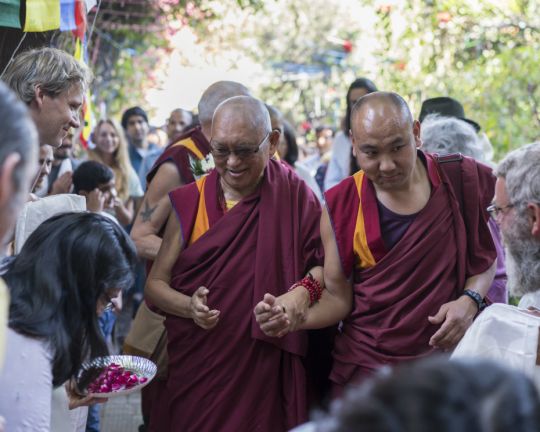
Lama Zopa Rinpoche arriving at Tushita Mahayana Meditation Centre, Delhi, India, March 2018. Photo by Ven. Lobsang Sherab.
Rinpoche visited Tushita Mahayana Meditation Centre in New Delhi, India, before traveling to the Bodhicaryavatara and Rinjung Gyatsa Retreat in Bendigo, Australia. On March 10-11, Rinpoche gave teachings, including oral transmissions of the Golden Light Sutra and of “The Method to Transform a Suffering Life into Happiness (Including Enlightenment),” at Tushita Mahayana Meditation Centre. Center director Renuka Singh shared this report:
Initially, Lama Zopa Rinpoche, spiritual director of FPMT and Tushita Mahayana Meditation Centre, was expected to come and teach in November 2017. The Delhi pollution somehow conspired to keep Rinpoche away. Finally, the auspicious time of his arrival in Delhi was on International Women’s Day, March 8, 2018.
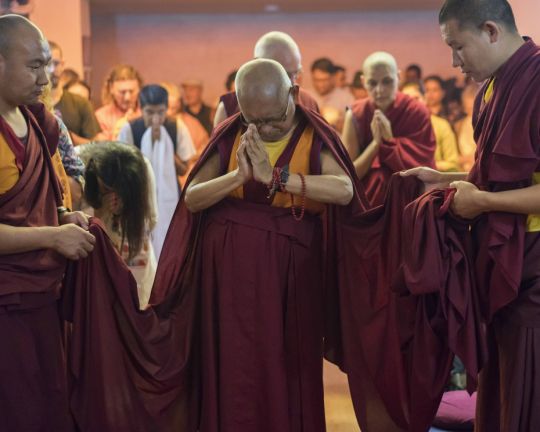
Lama Zopa Rinpoche prostrating before giving the oral transmission of the Sutra of Golden Light, Tushita Mahayana Meditation Centre, Delhi, India, March 2018. Photo by Ven. Lobsang Sherab.
The highlight of Rinpoche’s visit was the two-day teaching at Tushita. Dharma nectar blessings came in the form of the oral transmission of the sublime Golden Light Sutra on day one. Subduing one’s mind was greatly emphasized.
On day two, Rinpoche gave the oral transmission of “The Method to Transform a Suffering Life into Happiness (Including Enlightenment).” This included the generation of a good motivation and mantras for blessing the speech, malas, and so forth.
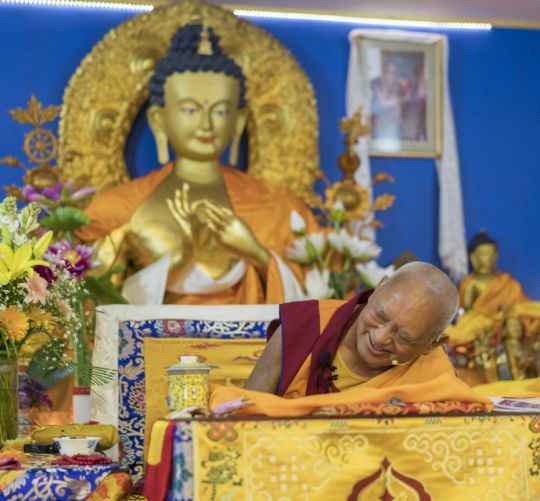
Lama Zopa Rinpoche at Tushita Mahayana Meditation Centre, Delhi, India, March 2018. Photo by Ven. Lobsang Sherab.
Rinpoche also granted refuge to forty people. Ninety percent of whom were Indians. Rinpoche concluded the teachings with Guru Puja, which ended at 1 a.m.
The gompa was jam-packed for the teachings—around 100 to 150 attendees of all ages were present. However, there was numerical preponderance of young people. Prof. Robert Thurman attended the first day. Several current and former directors of other Indian centres were also present.
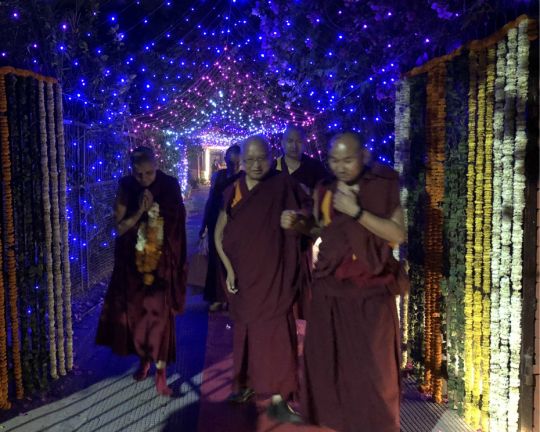
Rinpoche and the light offerings at Tushita Mahayana Meditation Centre, Delhi, India, March 2018. Photo by Ven. Lobsang Sherab.
The hard work of center spiritual program coordinator Ven. Gyalten Samten, especially, as well as of Ven. Kabir Saxena and all the volunteers and sponsors was highly appreciated. Rinpoche praised the decoration and light offerings at the center emphatically. Ven. Kabir gave the longest entertaining vote of thanks ever. As director, I was extremely honored and happy to host Rinpoche. The wait for Rinpoche’s next visit has already begun!
Watch Lama Zopa Rinpoche teach during the Bodhicaryavatara and Rinjung Gyatsa Retreat at The Great Stupa of Universal Compassion in Bendigo, Australia, March 30-May 12, 2018.
- Find links to watch teachings LIVE:
https://fpmt.org/media/streaming/lama-zopa-rinpoche-live/ - Watch, read, and listen to all of Rinpoche’s teachings from Bendigo at anytime:
https://fpmt.org/media/streaming/teachings-of-lama- zopa-rinpoche/
Lama Zopa Rinpoche is the spiritual director of the Foundation for the Preservation of Mahayana Tradition (FPMT), a Tibetan Buddhist organization dedicated to the transmission of the Mahayana Buddhist tradition and values worldwide through teaching, meditation and community service.
- Tagged: golden light sutra, renuka singh, robert thurman, the method to transform a suffering life into happiness, tushita mahayana meditation centre, ven. gyalten samten, ven. kabir saxena
9
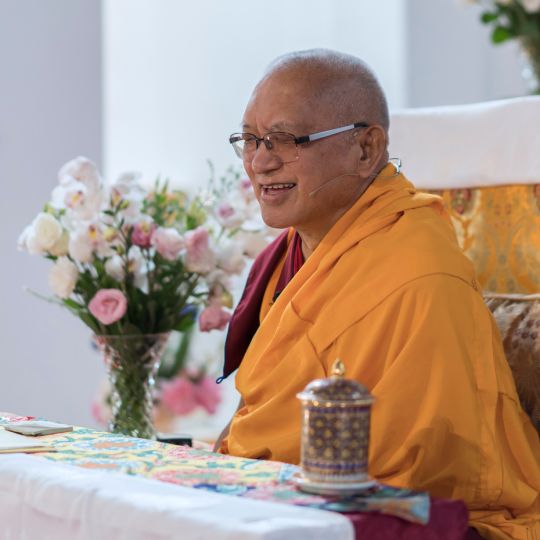
Lama Zopa Rinpoche giving a teaching at the Great Stupa of Universal Compassion, Bendigo, Australia, April 2018. Photo by Ven. Lobsang Sherab.
Lama Zopa Rinpoche gave advice about paying government tax and health insurance, instructing to see it as an opportunity to practice charity, thus a cause for happiness and full enlightenment, for oneself and others.
I spoke to the ex-Kopan monks and nuns in New York, in a restaurant run by people from Mustang. I talked to one Nepalese girl who had previously worked in Nepal for one year. She told me that after she got money from working in the United States, a lot of the money went as tax to the US government, in federal and state tax, and also for Medicare and health insurance. I gave her this advice about using every opportunity to become Dharma, especially Mahayana Dharma, so that it becomes the cause of enlightenment.
You have to pay tax to the state and federal government, as well as paying Medicare and health insurance, and then you feel resentful and become miserly, which is the cause of poverty. Also, by creating so much miserliness you become unhappy, but you have no choice because you have to give the money.
I said this is a most incredible opportunity for you to practice Dharma. By giving tax to the state and federal government you can use this as a method of giving charity and generating bodhichitta. When you have to make the payments, you can think about the purpose of paying this money.
Think, “May I myself achieve enlightenment in order to free the numberless sentient beings from the oceans of samsaric sufferings in the six realms and bring them to buddhahood—the total cessation of all the obscurations and completion of all the realizations. Therefore, I am making charity of this money.”
Thinking this way is incredible. This way, not only does it become Dharma, but it becomes the cause of oneself achieving buddhahood. It also becomes the cause of happiness for numberless sentient beings, to free them from oceans of samsaric sufferings and bring them to buddhahood—the total cessation of all the obscurations and completion of all the realizations. Therefore this becomes the cause of happiness. Wow, wow, wow, wow. Amazing, amazing, amazing. This becomes the best cause of happiness up to full enlightenment.
According to the Tengyur, Buddha said:
For any sentient being, who during the period of my teachings
Makes charity well (even if the material is the size of a hair)
For 80,000 eons will experience a great result of great enjoyment:
No pain, no disease, and enjoyment of happiness.
Like that, one will be enriched with the desirable things.
At the end you can actually achieve the result—the peerless cessation and completion (enlightenment).
After hearing that there is a great result, who wouldn’t want to collect merit?
Wow, wow, wow, wow, wow!
Here it mentions in the quotation that by making charity of something just the size of one single hair, you receive benefits for 80,000 eons. You will have unbelievable happiness and wealth, most unbelievable happiness, and also by continually making charity, at the end you will achieve enlightenment. Here the charity that you make is much more than money. It is unbelievable, unbelievable, unbelievable, so you can rejoice, you can feel very happy. It’s unbelievable, unbelievable, unbelievable.
It’s the same when you pay the health insurance and Medicare, because even though you are not sick all the time, there are many other sick people, who have cancer or incurable or curable diseases. The money goes for that, so again you are making charity. Wow, wow, wow, wow! So you should rejoice.
It’s unbelievable, it’s like the person who wins the soccer game—they are running around, all the nerves out, their shoulders up. In reality that is all done with attachment, so it’s the cause of the lower realms, but expressing happiness here, this is for enlightenment—full enlightenment for oneself and then to free the numberless sentient beings from the oceans of samsaric suffering and bring them to full enlightenment. Wow, wow, wow, wow!
It is very important to think this way, to use the situation of paying tax and so forth as a way to create the cause of enlightenment.
This advice, “Motivation for Paying Tax,” is from “Lama Zopa Rinpoche’s Online Advice Book,” published in January 2018 on the Lama Yeshe Wisdom Archive website:
https://lamayeshe.com/advice/motivation-paying-tax
Watch Lama Zopa Rinpoche teach during the Heart of Wisdom Retreat at the Great Stupa of Universal Compassion in Bendigo, Australia, March 30-May 12, 2018!
- Find links to watch teachings LIVE:
https://fpmt.org/media/streaming/lama-zopa-rinpoche-live/ - Watch, read, and listen to all of Rinpoche’s teachings from Bendigo at anytime:
https://fpmt.org/media/streaming/teachings-of-lama- zopa-rinpoche/
Lama Zopa Rinpoche is the spiritual director of the Foundation for the Preservation of Mahayana Tradition (FPMT), a Tibetan Buddhist organization dedicated to the transmission of the Mahayana Buddhist tradition and values worldwide through teaching, meditation, and community service.
- Tagged: lama zopa rinpoche, taxes
6
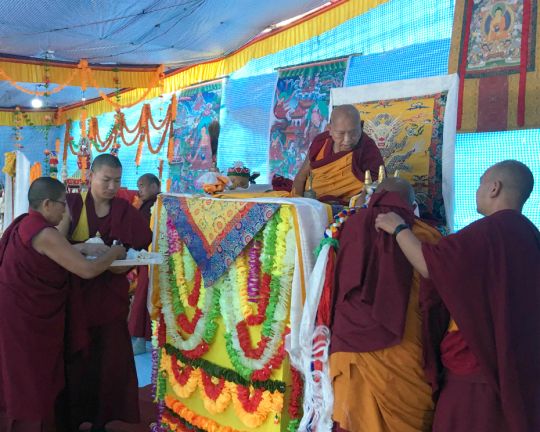
Lama Zopa Rinpoche receiving mandala offering, Taplejung, Nepal, March 2018. Photo courtesy of Ven. Thubten Jikdol.
In early March, Lama Zopa Rinpoche flew by helicopter to Taplejung Municipality in the Taplejung District in northeastern Nepal to attended a large event for world peace organized by the local community. Ven. Thubten Jikdol, a senior monk at Kopan Monastery, arranged for Lama Zopa Rinpoche to be a guest of honor at the event and shared this report.
Lama Zopa Rinpoche recently visited Taplejung for the second Vajra Guru Mantra Recitation Puja Ceremony for World Peace, organized by the Taplejung Vajra Guru Organizing Committee, March 4-6, 2018.
The World Peace puja attracted high lamas, approximately 250 ordained Sangha, and more than 5,000 lay students. During the three-day event, seven million Guru Rinpoche (Padmasambhava) mantras were recited.
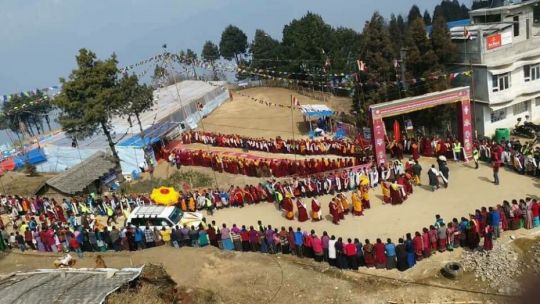
Lama Zopa Rinpoche arriving at the puja venue, Taplejung, Nepal, March 2018. Photo courtesy of Ven. Thubten Jikdol.
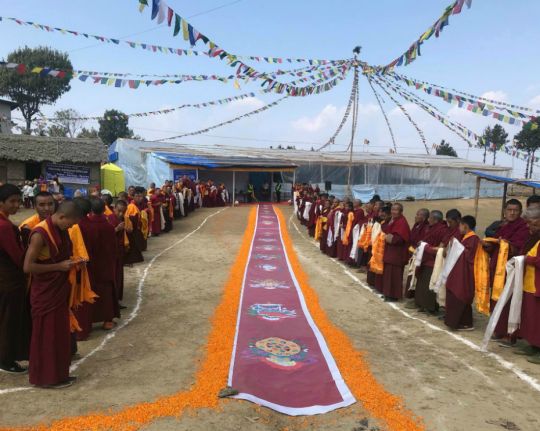
Sangha waiting to welcome Lama Zopa Rinpoche to the puja venue, Taplejung, Nepal, March 2018. Photo courtesy of Ven. Thubten Jikdol.
On March 5, Lama Zopa Rinpoche was warmly welcomed by a thousand people in a procession from Suketar Airport to the puja venue. As soon as Rinpoche arrived, the organizing committee made mandala offerings and a welcoming song and dance were offered by Sangag Dhechoe Ling Gompa School students.
Rinpoche gave a short teaching and also granted Mani mantra and Guru Rinpoche mantra oral transmissions.
After the teaching and oral transmission, Rinpoche visited Tashi Choeling Monastery and made a butter lamp offering and consecration blessing at a newly constructed stupa. Rinpoche also visited Sangag Dechoe Ling Monastery at Bungkulung.
On March 6, Lama Zopa Rinpoche gave a teaching and a White Tara long life initiation. A relic of the Buddha, received from the Dharmakaya Foundation, Thailand to Nepal Buddhist Federation, was exhibited to all.
The books Dear Lama Zopa and How to Be Happy by Lama Zopa Rinpoche, and Make Your Mind an Ocean by Lama Yeshe—all having been translated into Nepali—were distributed for free to people at the event.
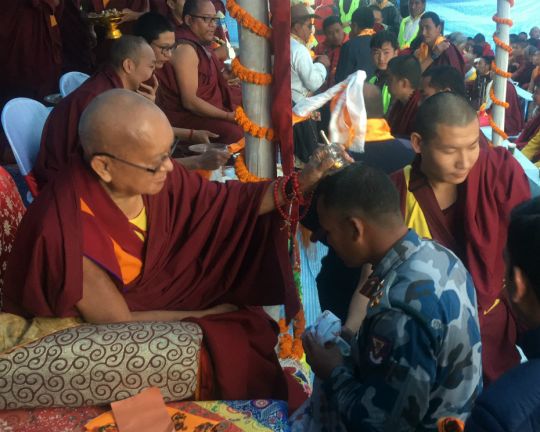
Lama Zopa Rinpoche giving blessing, Taplejung, Nepal, March 2018. Photo courtesy of Ven. Thubten Jikdol.
On March 7, before returning to Kathmandu, Lama Zopa Rinpoche made a short visit to a Hindu shrine at Pathibara Hill to pray for all the animals that are sacrificed at Pathibara Temple.
Rinpoche also kindly visited and blessed a new construction site on Sangag Dhechoe Ling Gompa School land. This school is very important for the area people. Most of the population of this region is Buddhist, but due to a lack of local Buddhist teachers and knowledge, people aren’t able to receive correct instruction to understand and practice authentic Buddhist teachings.
This ongoing decline is happening as a result of changes made in the name of modernization. The main objective of organizing such a school in this region is to preserve and promote Buddhadharma and the culture of the local people for the benefit of all mankind and world peace.
Watch Rinpoche teach from Bendigo, Australia, during the retreat at the Great Stupa of Universal Compassion, March 30-May 12. For details on the livestream:
https://fpmt.org/media/streaming/lama-zopa-rinpoche-live/
More information, photos and updates about FPMT spiritual director Lama Zopa Rinpoche can be found on Rinpoche’s webpage on FPMT.org. If you’d like to receive news of Lama Zopa Rinpoche and FPMT via email, sign up to FPMT News.
- Tagged: lama zopa rinpoche, nepal, taplejung
2
Rejoice That We Didn’t Die
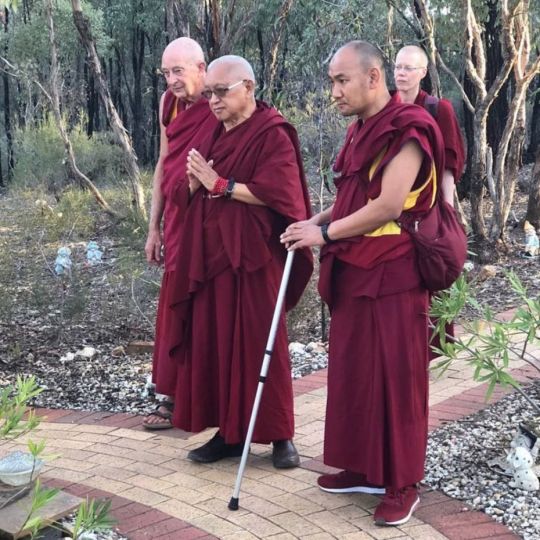
Lama Zopa Rinpoche on the path to the Great Stupa of Universal Compassion in Bendigo, Australia, where Rinpoche is leading a six-week retreat, April 2018. Photo via Lama Zopa Rinpoche on Instagram.
“Somebody who doesn’t know what to do—many [people] have practices in the life, commitments and many practices, but somebody who has no clear idea of what to practice; if they want to do some practice in the daily life but don’t know what to practice, what to do, my suggestion is that, something very simple,” Rinpoche advices in a teaching published in the Lama Yeshe Wisdom Archive September 2017 E-Letter.
“So first thing in the morning rejoice that so far we didn’t die, that we didn’t die, rejoice. Then after that, by remembering all those people who died, family members, then if there are gurus who passed away, remember those and family members who have passed away, friends who have died. Anyway, rejoice that we did not die so far. And again today we are able to be a human being, and not only that but we have a perfect human rebirth, so that we can achieve the three great meanings, more precious than the whole sky filled with the wish-granting jewels. All those are nothing compared with our precious human body, with which we can achieve three great meanings in every second, whatever we wish for. Even in every minute, we can achieve all that, because we can create the cause.
“So rejoice, then think death can happen any minute. Death can happen any [time], death can happen even today, any minute it can happen, any moment death can happen. Either make complete determination, thinking that we are going to die today, that’s the best, however, think it can happen any day, even today, in any minute it can happen. Then make strong determination of what we should do with our life. Then on the basis of correctly devoting to the virtuous friend, that’s how to practice Dharma. The most profitable way to practice Dharma is correctly devoting to the virtuous friend. That’s how to make our practice most successful.” …
Read the entire teaching “You Have Time to Get It Done” from teachings given at Tara Institute in Melbourne, Australia, in March 2000 and published in Lama Yeshe Wisdom Archive September 2017 E-Letter:
https://lamayeshe.com/article/e-letter-no-171-september-2017
Watch Rinpoche teach from Bendigo, Australia, during the retreat at the Great Stupa of Universal Compassion, March 30-May 12. For details on the livestream:
https://fpmt.org/media/streaming/lama-zopa-rinpoche-live/
More information, photos and updates about FPMT spiritual director Lama Zopa Rinpoche can be found on Rinpoche’s webpage on FPMT.org. If you’d like to receive news of Lama Zopa Rinpoche and FPMT via email, sign up to FPMT News.
- Tagged: death, lama yeshe wisdom archive, lama zopa rinpoche, rejoice
30
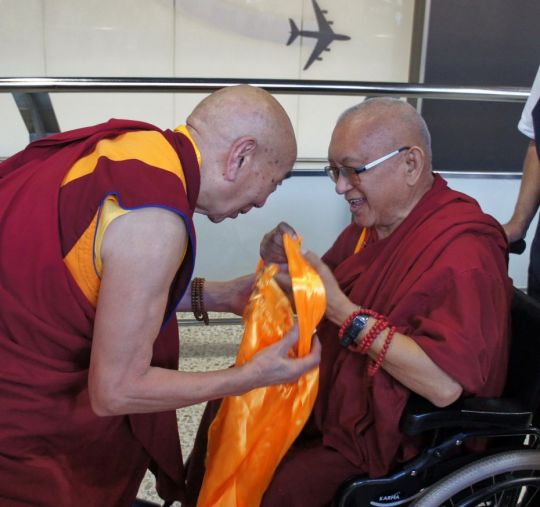
Geshe Lobsang Doga greeting Lama Zopa Rinpoche at the airport in Melbourne, Australia, March 2018. Photo courtesy of Tara Institute’s Facebook page.
Lama Zopa Rinpoche arrived in Australia, where he’ll be teaching through early June. Rinpoche was greeted at the airport in Melbourne by Geshe Lobsang Doga, resident geshe of Tara Institute, and Tara Institute students.
Then Rinpoche was driven two hours to Bendigo, Australia, home of the Great Stupa of Universal Compassion to lead a six-week retreat. Rinpoche is teaching on Shantideva’s A Guide to the Bodhisattva’s Way of Life (Bodhicaryavatara), with the optional tantric empowerments of Chakrasamvara and Rinjung Gyatsa.
Rinpoche’s teachings during the retreat are being livestreamed. For details, see:
https://fpmt.org/media/streaming/lama-zopa-rinpoche-live/
The retreat runs March 30-May 12. Many people have been working to get the Great Stupa ready for the retreat. A very large thangka of the Twenty-One Taras is hanging in the gompa inside the Great Stupa. This retreat is the third in a series of retreats given by Rinpoche in this location.
“This retreat came about because the late Khunu Lama Rinpoche requested Lama Zopa Rinpoche to translate Shantideva’s Bodhicaryavatara (A Guide to the Bodhisattva’s Way of Life),” explained Ven. Roger Kunsang, Rinpoche’s assistant and CEO of FPMT.
“Khunu Lama Rinpoche made this request after he gave Lama Zopa Rinpoche the commentary on the Bodhicaryavatara at Lama Zopa Rinpoche’s request. So Lama Zopa Rinpoche is teaching the Bodhicaryavatara at the same time as translating it. (A small team led by Ven. Ailsa Cameron is carefully noting Rinpoche’s translation as he teaches.)
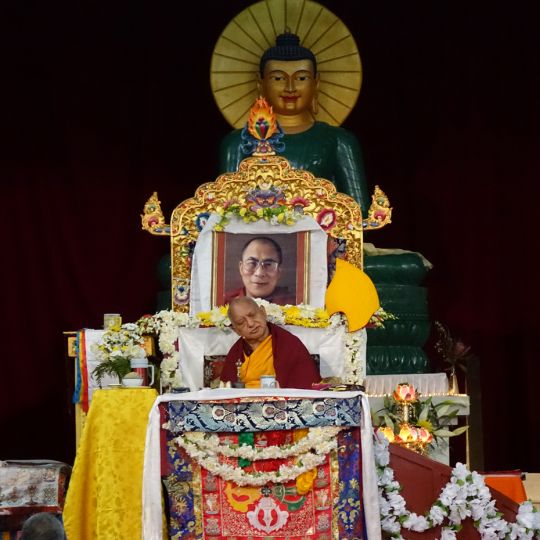
Lama Zopa Rinpoche teaching at the Great Stupa of Universal Compassion, Bendigo, Australia, October 2014. Photo by Ven. Roger Kunsang.
“Then Lama Zopa Rinpoche was requested by Ven. Gyatso (director of Thubten Shedrup Ling Monastery in Bendigo) to give the Rinjung Gyatsa set of initiations, which is quite rare. Rinpoche commented that it is common in the Tibetan Buddhist tradition to organize initiations into ‘sets.’ Also that different deities have different purposes and benefits, and that once you receive the permission to practice that deity, you have more potential to help others and are also helping to preserve Buddhism.
“Lama Zopa Rinpoche has combined both into one retreat. The first installment of this retreat was in April 2011 and the second installment took place in September-October 2014.”
Read about the April 2011 retreat in the Mandala story “The Retreat of a Life Time.” The September-October 2014 retreat was covered in many FPMT news blog posts, which include links to video from Rinpoche’s teachings there. You can also access video recordings of Rinpoche’s teachings from the Australia 2014 retreat on FPMT’s Rinpoche Available Now page (fpmt.org/rinpochenow/).
Watch Rinpoche teach from Bendigo, Australia, during the retreat at the Great Stupa of Universal Compassion, March 30-May 12. For details on the livestream:
https://fpmt.org/media/streaming/lama-zopa-rinpoche-live/
Lama Zopa Rinpoche is the spiritual director of the Foundation for the Preservation of Mahayana Tradition (FPMT), a Tibetan Buddhist organization dedicated to the transmission of the Mahayana Buddhist tradition and values worldwide through teaching, meditation, and community service.
- Tagged: australia, australia retreat 2018, bendigo, fpmta, great stupa of universal compassion, lama zopa rinpoche
26
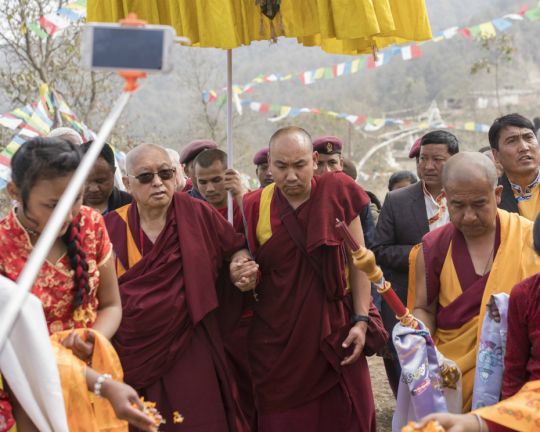
Lama Zopa Rinpoche, welcomed by local people, going to bless the stupa built by Losang Namgyal Rinpoche, who is leading Rinpoche, in Pakarbas, Nepal, February 2018. Photo by Ven. Lobsang Sherab.
On February 25, Lama Zopa Rinpoche and Losang Namgyal Rinpoche, the head lama of Nepal’s Tamang people, consecrated a newly built 45-foot (14-meter) tall Enlightenment Stupa in Pakarbas, Ramechhap, Nepal. The stupa was built by Losang Namgyal Rinpoche and the local people and sponsored by Lama Zopa Rinpoche. Monks from Kopan’s lower tantric college also participated in the stupa consecration. Rinpoche was enthusiastically welcomed to the event, which was well attended by high officials and villagers.
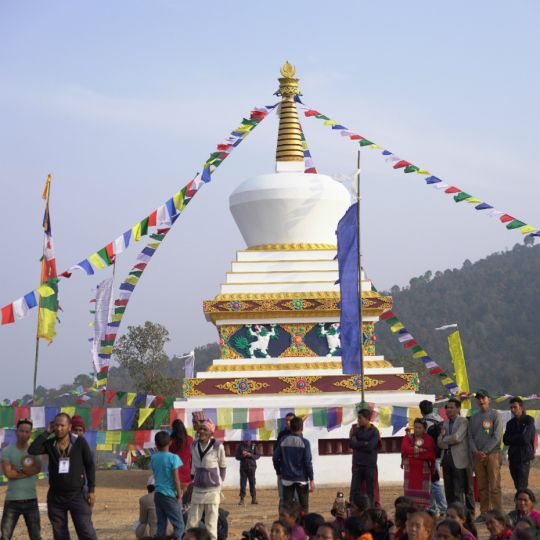
45-foot-tall Enlightenment Stupa built by Losang Namgyal Rinpoche and local community, Pakarbas, Ramechhap, Nepal, February 2018. Photo by Ven. Lobsang Sherab.
Rinpoche then traveled to Pokhara, Nepal’s second largest city and the site of many lakes. Rinpoche spent a few of the 15 Days of Miracles in Pokhara, where he devoted a lot of time to blessing food and water for the fish and living beings in the lakes. Rinpoche went out on a boat on Begnas Lake, Pokhara’s second largest lake, and offered the food and water with prayers and mantras.
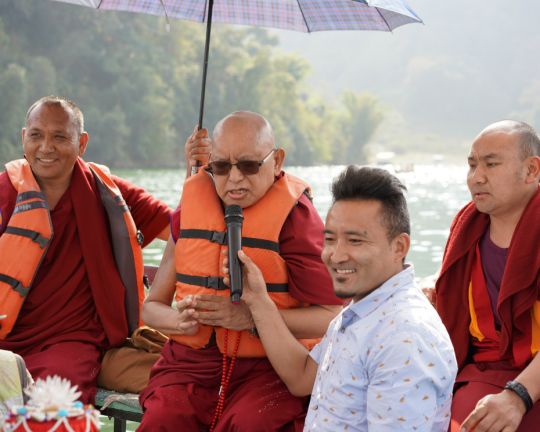
Lama Zopa Rinpoche blessing the fish and all beings in the lake with mantras and prayers, Pokhara, Nepal, March 2018. Photo by Ven. Lobsang Sherab.
Wherever Rinpoche goes, he makes an effort to prioritize this kind of charity.
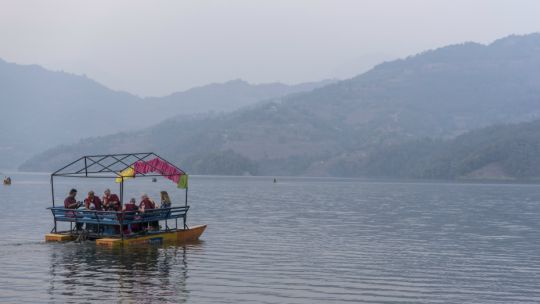
Lama Zopa Rinpoche blessing the fish in the lake, Pokhara, Nepal, March 2018. Photo by Ven. Lobsang Sherab.
Rinpoche also visited the Jampaling Tibetan settlement near Pokhara, where Rinpoche saw a Maitreya statue that speaks and other holy objects, many brought from Tibet.
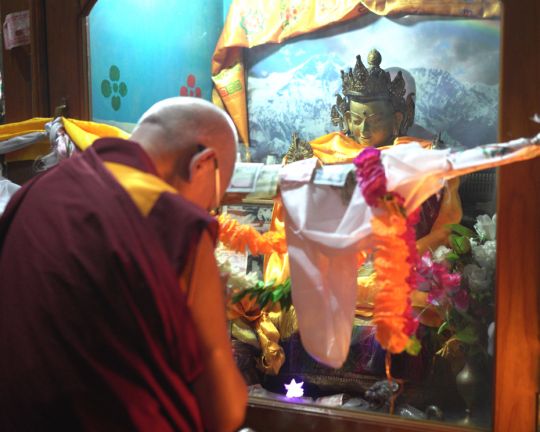
Rinpoche making prayers in front of the Maitreya statue that speaks at Jampaling Tibetan settlement, Nepal, February 2018. Photo by Ven. Lobsang Sherab.
Rinpoche next traveled by helicopter to a village in Taplejung district in mountainous northeastern Nepal. Rinpoche gave a White Tara initiation attended by approximately 5,000 people, some traveling for two days on foot to get there.
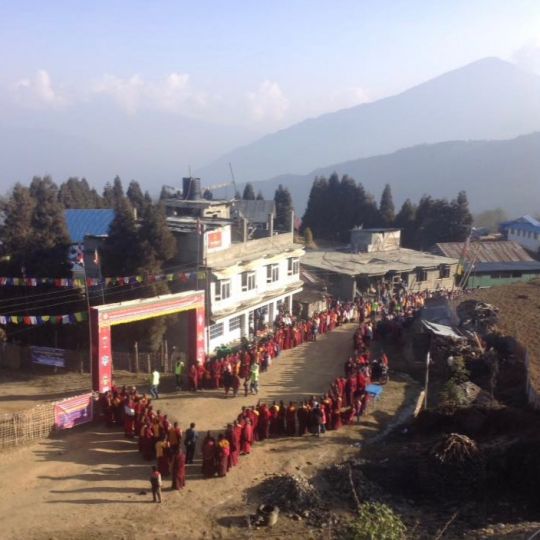
Local Sangha and villagers line up to welcome Lama Zopa Rinpoche, Solu Khumbu, Nepal, March 2018. Photo by Pema Tengya via Facebook.
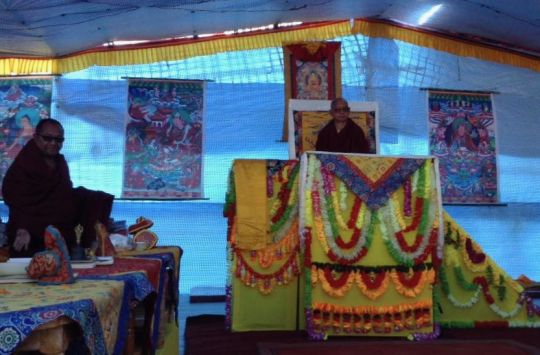
Lama Zopa Rinpoche during White Tara initiation, Solu Khumbu, Nepal, March 2018. Photo by Pema Tengya via Facebook.
This event and the stupa consecration were both quite special as Rinpoche does not often lead ceremonies for local people in the rural areas of Nepal.
After returning briefly to Kopan, Rinpoche traveled to Tushita Mahayana Meditation Centre in Delhi, India.
See the new photo album from Lama Zopa Rinpoche’s February-March visit to Nepal:
https://fpmt.org/teachers/zopa/gallery/nepal-february-march-2018/
Watch Rinpoche teach from Bendigo, Australia, during the retreat at the Great Stupa of Universal Compassion, March 30-May 12. For details on the livestream:
https://fpmt.org/media/streaming/lama-zopa-rinpoche-live/
Lama Zopa Rinpoche is the spiritual director of the Foundation for the Preservation of the Mahayana Tradition (FPMT), a Tibetan Buddhist organization dedicated to the transmission of the Mahayana Buddhist tradition and values worldwide through teaching, meditation and community service.
- Tagged: lama zopa rinpoche, losang namgyal rinpoche, nepal, pokhara, taplejung
19
Lama Zopa Rinpoche composed a long and detailed letter for FPMT Annual Review 2017: Serving the Teachings of the Buddha. We’re happy to share part of Rinpoche’s four-page letter, which was written in January 2018 in Tso Pema, Himachal Pradesh, India:
My most precious, most kind, most dear, wish-fulfilling directors, students, benefactors, and friends,
Here, I am dropping some news from the sky—for some it will be new, for some it will be old teachings.
Firstly, from the bottom of my heart and bones, thank you numberless times for all your service; dedication; practice of holy Dharma with your body, speech, and mind; and for your devotion and good heart.
The ultimate aim is to benefit sentient beings, whose minds are obscured and suffering, and for them to achieve happiness in this life and happiness in future lives, then the ultimate happiness of liberation from samsara and of buddhahood, the total cessation of obscurations and completion of realizations. Therefore, sentient beings receive all the peace and happiness up to enlightenment by serving the teachings of Buddha, so that the teachings exist continually and develop, and also by serving the Sangha, who preserve and spread Dharma in this world.
So here, mostly we have been able to help by building monasteries and nunneries, making offerings to holy objects, helping the Sangha with Dharma education and survival, and offering help to the elderly and to schools.
As Buddha said:
Any sentient being who, during the period of my teachings,
Makes charity well (even if the material is the size of a hair),
For 80,000 eons there will be great results of great enjoyment:
No pain, no disease, and enjoyment of happiness.
Like that, one will be enriched with the desirable things.
At the end, you can actually achieve the result: the peerless cessation and completion (enlightenment).
After hearing that there is this great result, who wouldn’t want to collect merit? This is just to get some idea of the benefits.
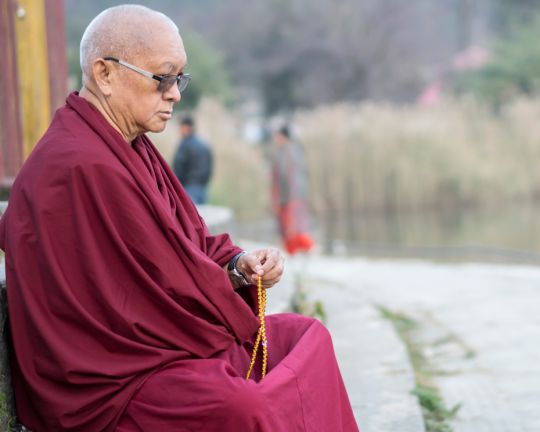
Lama Zopa Rinpoche blessing the fish in the lake and doing prayers, Tso Pema, India, January 2017. Photo by Ven. Lobsang Sherab.
Now, in regard to making offerings to the guru, and not just me Guru Mickey Mouse, but to anyone from whom you have received Dharma contact with the recognition of guru-disciple: Just by offering scented smell to the pores of the guru’s holy body you collect so much unbelievable merit, more than from having made extensive offerings to numberless Buddha, Dharma, Sangha and numberless statues, stupas, and scriptures.
As I normally mention, compared to other people, your own parents are a more powerful object with which to collect merit. That’s why you can experience the result in this life of whatever service you did for your parents in this life. The good karma is so powerful that you can start to experience the result—happiness and success—in this life. The negative karma that is created in relation to your parents, such as by complaining to or harming your parents, even a very little, is very, very heavy, and you start to experience the suffering in this life. You experience the suffering result not only in this life but in future lives as well for 500 lifetimes.
After that, ordained Sangha are a more powerful object than your parents. Then more powerful than ordained Sangha are arhats. Then more powerful than numberless arhats is one bodhisattva, one who has generated bodhichitta. It is said by Buddha in the sutras and also quoted in the lamrim commentaries that if you don’t have bodhichitta and you glare at a bodhisattva just one time, the negative karma is so heavy that it is like having taken out the eyeballs of all the sentient beings of the three realms (desire realm, form realm, and formless realm). If you look at one bodhisattva with a devoted, calm mind, with respectful eyes, then you collect merit like having made charity of your eyes to all the sentient beings in the three realms. (This is in regard to how one bodhisattva is extremely powerful, more powerful than numberless arhats, whether you harm the bodhisattva or make offerings or offer service.)
After that, even more powerful is one buddha. One buddha is more powerful than numberless bodhisattvas. From even a small act of disrespect towards one buddha, the negative karma is unbelievably heavy; and from just a little service, a little respect toward one buddha, the result is unbelievable happiness. This is because one buddha is more powerful than numberless bodhisattvas.
Now to the guru—not just anyone known in the world as a guru but the guru with whom you have a Dharma connection, a guru-disciple connection—offering just a little service, as I mentioned before, has the greatest benefit, more benefit than from making offerings to numberless Buddha, Dharma, Sangha and numberless statues, stupas, and scriptures. This is not just offering the guru service, but also fulfilling the guru’s wishes and advice.
It is mentioned in the lamrim teachings that each time one makes an offering to the guru, even a small nut or a glass of water, one becomes closer to enlightenment. So, you have to figure out the value of the rest, such as offering service and the offerings that you make, from this. Then, there is no hesitation to say that you do the greatest purification and collect the greatest merit by fulfilling the guru’s wishes and following his advice and teachings. For example, every day, every hour, every minute, every second that you keep your vows or recite mantras or offer any service, you become closer and closer to enlightenment. …
Read the entire letter from Lama Zopa Rinpoche in FPMT Annual Review 2017:
https://issuu.com/fpmtinc/docs/fpmt_ar_2017_issuu/2
We invite you to read FPMT Annual Review 2017: Serving the Teachings of the Buddha, now available online in eZine and PDF formats:
https://fpmt.org/fpmt/annual-review/
See photo highlights from Lama Zopa Rinpoche’s 2017:
https://fpmt.org/teachers/zopa/gallery/lama-zopa-rinpoches-2017/
Lama Zopa Rinpoche is the spiritual director of the Foundation for the Preservation of Mahayana Tradition (FPMT), a Tibetan Buddhist organization dedicated to the transmission of the Mahayana Buddhist tradition and values worldwide through teaching, meditation and community service.
- Tagged: annual review, lama zopa rinpoche
- Home
- News/Media
- Study & Practice
- About FPMT Education Services
- Latest News
- Programs
- New to Buddhism?
- Buddhist Mind Science: Activating Your Potential
- Heart Advice for Death and Dying
- Discovering Buddhism
- Living in the Path
- Exploring Buddhism
- FPMT Basic Program
- FPMT Masters Program
- FPMT In-Depth Meditation Training
- Maitripa College
- Lotsawa Rinchen Zangpo Translator Program
- Universal Education for Compassion & Wisdom
- Online Learning Center
- Prayers & Practice Materials
- Overview of Prayers & Practices
- Full Catalogue of Prayers & Practice Materials
- Explore Popular Topics
- Benefiting Animals
- Chenrezig Resources
- Death & Dying Resources
- Lama Chopa (Guru Puja)
- Lama Zopa Rinpoche: Compendium of Precious Instructions
- Lama Zopa Rinpoche: Life Practice Advice
- Lama Zopa Rinpoche Practice Series
- Lamrim Resources
- Mantras
- Prayer Book Updates
- Purification Practices
- Sutras
- Thought Transformation (Lojong)
- Audio Materials
- Dharma Dates – Tibetan Calendar
- Translation Services
- Publishing Services
- Teachings and Advice
- Find Teachings and Advice
- Lama Zopa Rinpoche Advice Page
- Lama Zopa Rinpoche: Compendium of Precious Instructions
- Lama Zopa Rinpoche Video Teachings
- ༧སྐྱབས་རྗེ་བཟོད་པ་རིན་པོ་ཆེ་མཆོག་ནས་སྩལ་བའི་བཀའ་སློབ་བརྙན་འཕྲིན།
- Podcasts
- Lama Yeshe Wisdom Archive
- Buddhism FAQ
- Dharma for Young People
- Resources on Holy Objects
- Ways to Offer Support
- Centers
- Affiliates Area
- Teachers
- Projects
- Charitable Projects
- Make a Donation
- Applying for Grants
- News about Projects
- Other Projects within FPMT
- Support International Office
- Projects Photo Galleries
- Give Where Most Needed
- FPMT
- Shop
Translate*
*powered by Google TranslateTranslation of pages on fpmt.org is performed by Google Translate, a third party service which FPMT has no control over. The service provides automated computer translations that are only an approximation of the websites' original content. The translations should not be considered exact and only used as a rough guide.Buddhism is not at all a tactful religion, always trying to avoid giving offense. Buddhism addresses precisely what you are and what your mind is doing in the here and now. That’s what makes it so interesting.









